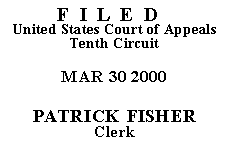

| UNITED STATES OF AMERICA, |
|
| v. | |
| BENANCIO POLANCO-POLANCO, |
On September 1, 1998, the defendant Mr. Polanco-Polanco pleaded guilty to attempted distribution of a controlled substance in Utah state court. Pursuant to the written state court order, Mr. Polanco-Polanco was placed on probation and ordered "to leave the United States of America and/or State of Utah if not deported, defendant to leave within 10 days of release." Aplt Br. at 5. At sentencing, the state court judge explained that a condition of his probation was: "that you either voluntarily leave the Country or submit yourself to deportation . . . and not reenter the Country unless you have the express permission of the Attorney General of the United States." Stipulated Record for Appeal, dated Dec. 9, 1999, at 2, attached to Aple Br.
On September 11, 1998, while incarcerated in a jail in Salt Lake City and subject to the state court order, INS agents interviewed Mr. Polanco-Polanco. The agents advised Mr. Polanco-Polanco of his Miranda rights. Mr. Polanco-Polanco signed a written waiver of his rights and provided the agents with incriminating statements regarding his true identity, citizenship, entry into the United States, and criminal history. Based on this information, the United States brought charges against Mr. Polonco for unlawful re-entry (after conviction of an aggravated felony), pursuant to 8 U.S.C. § 1326. See Rec. vol. I, doc. 1, 3.
Mr. Polanco-Polanco filed a motion to suppress his confession, which the district court denied. Consequently, Mr. Polanco-Polanco entered a conditional plea of guilty on the aggravated re-entry charge, preserving the right to appeal the district court's denial of his motion to suppress.
Mr. Polanco-Polanco now appeals the denial of his motion to suppress his confession. He argues the waiver of his Miranda rights, given to INS agents who interviewed him while he was incarcerated in a Salt Lake City jail, was not voluntary because a Utah state court had ordered him to "submit [himself] to deportation" and, therefore, his Fifth Amendment right not to incriminate himself was violated. We affirm for substantially the same reasons as the district court.
First, the court order gave Mr. Polanco-Polanco the option of submitting to deportation or leaving voluntarily. Thus, Mr. Polanco-Polanco was not forced by the state court order to waive his Miranda rights and provide incriminating statements to the INS.
Second, the Fifth Amendment is rooted in protection against government coercion, but more specifically, improper police tactics. The Supreme Court has explained that:
the cases considered by this Court over the 50 years since Brown v. Mississippi have focused upon the crucial element of police overreaching. While each confession case has turned on its own set of factors justifying the conclusion that police conduct was oppressive, all have contained a substantial element of coercive police conduct. Absent police conduct causally related to the confession, there is simply no basis for concluding that any state actor has deprived a criminal defendant of due process of law.
Colorado v. Connelly, 107 S. Ct. 515, 520 (1986). Thus, as the government points out in its brief, "traditional voluntariness analysis focuses on characteristics of the person, circumstances of the interview, and tactics employed by the police." Aple Br. at 6 (citing United States v. Guerro, 983 F.2d 1001, 1004 (10th Cir. 1993)).
Yet, Mr. Polanco-Polanco raises no arguments with respect to these issues. Specifically, he does not allege that the INS agents used coercive tactics during the interrogation. Rather, Mr. Polanco-Polanco argues that his statements were involuntary within the meaning of the Fifth Amendment because there was "direct government action and actual governmental coercion in the form of a state court Order." Aplt Br. at 11. However, we conclude there is insufficient nexus between the state court order and Mr. Polanco-Polanco's confession to the INS agents. More importantly, there is nothing in the state court order that is improperly coercive or that constitutes government overreaching within the meaning of the Fifth Amendment privilege against self-incrimination.
Accordingly, the district court's denial of Mr. Polanco-Polanco's motion to suppress his confession is AFFIRMED.
Entered for the Court,
Robert H. Henry
Circuit Judge
*.This order and judgment is not binding precedent, except under the doctrines of law of the case, res judicata, and collateral estoppel. The court generally disfavors the citation of orders and judgments; nevertheless, an order and judgment may be cited under the terms and conditions of 10th Cir. R. 36.3.